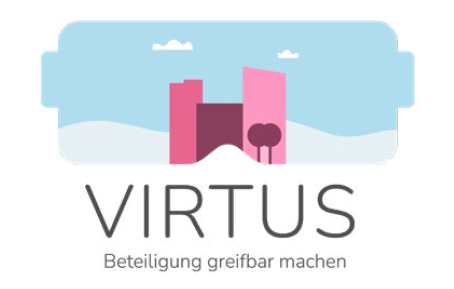SDI4ECom
Secure and self-determined digital identities in e-commerce
Start: 08/2021
End: 07/2024
The Corona pandemic has also increased the demand for tools for digital participation and dialogue formats that make planning drafts tangible for all participants. For citizen participation formats in urban development, such as workshops and spatial explorations, participants must be present. They exclude people who, for example, are prevented from participating due to time constraints or physical barriers.
In the VIRTUS project, therefore, a communicative real-time participation platform is being developed using virtual reality applications that enable people to experience urban spaces and 3D models onsite as well as digitally and create spaces for personal interaction. Interested parties can participate in analog VR tours or do so from the comfort of their own homes. With digital space exploration, planners can present planned areas or urban development designs and hold variant discussions with stakeholders.
The aim of VIRTUS is to test and explore a cross-media immersive participation design that reaches as many participants as possible.
The research focus Digital Democracy and Participation addresses inclusive, modern, and democratic forms of digital participation as well as the opportunities and challenges of digital democracy.
This research focus includes the research and design of sustainable IT innovations in the cross-sectional areas of energy, mobility, production, water management, and logistics. This involves developing systems that promote the ecologically, socially, and economically sustainable use of resources, and providing strategic consultancy services to companies, particularly SMEs, on their path to greater sustainability.

Funding notice:
The VIRTUS project is funded by the Federal Ministry of Education and Research (BMBF).
Project partners:
Secure and self-determined digital identities in e-commerce
Jointly moving people and goods
Stopping pathogen transmission in hospitals quickly, reliably, and comprehensively using AI.
Body-worn sensors and wearables for recording vital data and identifying health-related issues in mental and psychosomatic disorders
Efficient and highly accurate data generation for AI applications in autonomous driving
Generative AI in Software Development with a focus on smart home applications.
Standardized interfaces for greater speed, safety, and sovereignty in vehicle development
New approaches for interconnected hospital logistics
The modular toolbox for flexible robotics, tailored to the needs of small and medium-sized automotive suppliers
An AI Dashboard helping young people uncover online disinformation